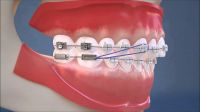
A visit to the dentist's office could provide a glimpse into your heart and brain health.
More than an estimated 100 diseases can show symptoms in the mouth. For instance, periodontal disease, which results from infections and inflammation of the gums and bone that support and surround the teeth, is more common and may be more severe in people with diabetes.
Other times, prescription drugs may affect the mouth. For instance, some drugs used to treat hypertension can cause swollen, inflamed gums.
"We see a lot of systemic diseases with oral signs and symptoms,"
Dentists might be able to pick up on red flags about a patient's overall health before they even start poking around in the mouth. Perkins teaches in several courses that focus on evaluating and following up on patients' medical health histories.
"Through that process, we sometimes come across important medical findings,"
Hypertension
A blood pressure may be taken before a cleaning or a dental procedure that requires a local anesthetic, Perkins said. Most dental offices ask first-time visitors to fill out medical history forms that are updated periodically, much like at the doctor's office.
"Every contact that a patient makes with the health care system is another opportunity for prevention, and hypertension is a classic example of a condition where this may make all the difference," said Dr. Dhruv Satish Kazi, associate professor of medicine at Harvard Medical School in Boston. Many dental clinics will check blood pressure, he said, "and can therefore identify patients who need to be connected with care."
Dentist offices, he added, can serve as a touchpoint for other services, especially for residents of lower-income or rural areas that may not have as many health care professionals.
For people already diagnosed with high blood pressure, some hypertension drugs can cause dry mouth. When the salivary glands don't produce enough saliva to keep the mouth wet, tooth decay accelerates, since saliva protects against decay. In those cases, Perkins said, dentists work with the patient's health care professional to manage side effects.
Diabetes
Untreated diabetes can lead to serious medical problems, including cardiovascular disease. In some patients, blood sugar can lead to disruptions in the oral microbiome—the vast collection of friendly bacteria, viruses and other microbes that live in the mouth. That could mean gum disease, bone loss and losing teeth.
"We do see this phenomenon where people who perceive themselves to be healthy may not go to the doctor," "Because (undiagnosed) diabetes and hypertension can present without clear symptoms, we may just happen to see them first. Unfortunately, it's not uncommon for us to see."
COVID
"It's magical thinking that our dental colleagues have the bandwidth to talk at length about heart disease, just like our cardiology colleagues don't have the time to talk about dental health more broadly," . "But there are enough synergies for the two to connect and improve cardiovascular screening and care."



